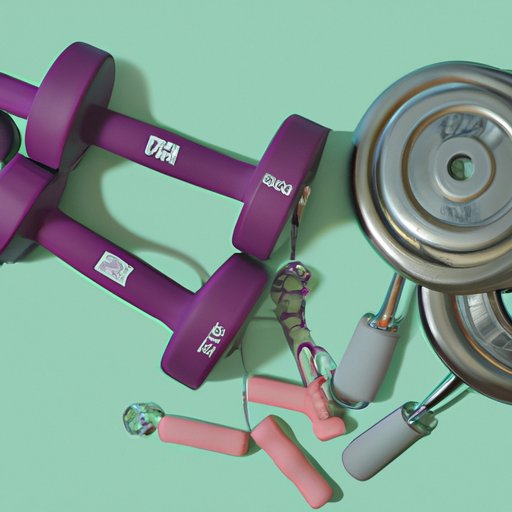
Introduction
Do you ever wonder why some people seem to stay slim no matter what they eat, while others struggle to lose weight no matter how much they exercise? The answer may have to do with metabolism. This complex process of converting food into energy varies from person to person, and exercise has long been touted as a way to boost it.
In this article, we’ll explore the truth behind claims that exercise can increase metabolism. We’ll look at the science behind this claim, debunk common myths, and examine the many benefits of regular exercise for your overall health and weight loss goals. Whether you’re a fitness enthusiast or just getting started on your journey, this guide will provide valuable insights for staying motivated and seeing results.
The Science Behind Exercise and Metabolism: Explained
Before we dive into the connection between exercise and metabolism, let’s start with some definitions.
Definition of Metabolism
Metabolism refers to the chemical reactions that occur in your body to keep you alive and energized. These processes involve the breakdown of food into energy, the storage of excess energy in fat cells, and the elimination of waste products.
Understanding Exercise Metabolism
Exercise metabolism refers to the way your body uses energy during physical activity. When you exercise, your muscles need energy to move, and this energy comes from a complex interplay of biochemical reactions in your cells.
How Exercise Impacts Metabolism
When you engage in physical activity, your body burns calories to supply energy to your muscles. This increase in energy expenditure can lead to a temporary boost in metabolism that can continue for hours after your workout. This is known as the afterburn effect, or excess post-exercise oxygen consumption (EPOC).
Additionally, regular exercise can increase the amount of lean muscle mass in your body, which is more metabolically active than fat tissue. This means that even at rest, your body will burn more calories if you have more muscle mass.
Debunking the Myths About Exercise and Metabolism
Now that we’ve covered the basics of metabolism and exercise metabolism, let’s tackle some common myths about this relationship.
Common Misconceptions About Exercise and Metabolism
Myth #1: Drinking cold water boosts metabolism.
Myth #2: Eating spicy foods increases metabolism.
Myth #3: A high protein diet speeds up metabolism.
Reasons Why These Myths Are Not Accurate
While these claims may seem compelling, scientific research has not found conclusive evidence to support them. Drinking cold water or eating spicy foods might have a minor, short-term effect on metabolism, but these effects are negligible compared to the benefits of regular exercise and a healthy diet.
Facts About the Relationship Between Exercise and Metabolism
Research has consistently shown that regular exercise can lead to an increase in metabolism over time. The exact amount of increase will vary depending on factors like age, gender, and body composition, but the overall trend is clear: exercise is an effective way to boost metabolism and maintain a healthy weight.
The Connection Between Exercise and Increased Metabolism: Why It Matters
Now that we know that exercise can increase metabolism, let’s take a closer look at why this relationship matters.
How Exercise Increases Metabolism
As we mentioned earlier, exercise can boost metabolism in a number of ways. The temporary increase in energy expenditure that occurs during and after exercise can lead to a short-term boost in metabolism, but the real benefits come from long-term changes to your body’s composition.
When you engage in regular exercise, you increase the amount of lean muscle mass in your body. This muscle tissue requires more energy to maintain than fat tissue, which means that your body will burn more calories even at rest. Additionally, exercising can increase the number of mitochondria in your cells. These tiny organelles are responsible for producing energy, and having more of them can lead to a more efficient metabolism overall.
The Impact of Metabolism on Weight Loss
Metabolism plays a crucial role in weight loss. When you consume fewer calories than your body needs to maintain its current weight, it must use stored energy (i.e. fat) to make up the difference. The faster your metabolism, the easier it is for your body to access this stored energy and burn it off.
The Connection Between Metabolism and Overall Health
Metabolism also has a broader impact on overall health. A sluggish metabolism can lead to low energy levels, poor mood, and an increased risk for chronic diseases like diabetes, high blood pressure, and heart disease. By contrast, a healthy metabolism can help you feel more energized, improve your brain function, and reduce your risk for many health problems.
The Benefits of Regular Exercise on Your Metabolism and Overall Health
Now that we’ve explored the science behind exercise and metabolism, let’s dive into the many benefits of regular exercise for your health and well-being.
Specific Benefits of Exercise on Metabolism
In addition to the temporary boost in metabolism that occurs during and after exercise, regular physical activity can have more long-term effects on your metabolism. As we mentioned earlier, exercise can increase the amount of lean muscle mass in your body, which in turn can lead to a higher resting metabolic rate. Additionally, exercise can increase the number of mitochondria in your cells, leading to a more efficient metabolism overall.
Benefits of Regular Exercise on Weight Loss and Health
Exercise is a key component of any weight loss plan. By burning calories and increasing metabolism, it can help you achieve your weight loss goals more quickly and maintain your progress over time. Beyond weight loss, regular exercise has been shown to have a wide range of health benefits, including:
- Reduced risk of chronic diseases like heart disease, diabetes, and cancer
- Improved heart health and circulation
- Reduced inflammation in the body
- Improved mood and cognitive function
- Enhanced bone density and balance, reducing the risk of falls and fractures later in life
How Exercise Can Improve Your Overall Well-being
Exercise is not just about physical health – it can also have a positive impact on your mental and emotional well-being. Regular physical activity has been shown to reduce symptoms of anxiety and depression, improve self-esteem, and provide a sense of accomplishment and purpose. By making exercise a part of your daily routine, you can experience improved energy, better sleep, and an overall sense of vitality and wellness.

The Five Best Exercises to Boost Your Metabolism
Ready to get started with an exercise routine that will help boost your metabolism? Here are five of the best exercises to incorporate into your fitness plan:
1. High-Intensity Interval Training (HIIT)
HIIT involves short bursts of intense exercise followed by periods of rest. This type of training can lead to a significant increase in metabolism and fat burning.
2. Strength Training
Lifting weights or performing bodyweight exercises can increase lean muscle mass and boost your metabolism over time.
3. Cardiovascular Exercise
Moderate-intensity cardiovascular exercise like running, cycling, or swimming can help you burn calories, increase heart and lung health, and improve metabolism.
4. Yoga
Yoga can improve flexibility and balance, help reduce stress, and increase muscle strength, all of which can lead to a healthier metabolism.
5. Pilates
Pilates focuses on core strength and stability, which can help improve posture, reduce pain, and increase metabolism over time.
How Exercise Can Help You Lose Weight and Keep It Off
To effectively lose weight and keep it off, exercise is a crucial component of any healthy lifestyle plan. Here’s why:
How Exercise Impacts Weight Loss
When you engage in regular physical activity, you increase your body’s overall energy expenditure. This means you burn more calories throughout the day, which can lead to weight loss over time. Additionally, exercise can help you preserve lean muscle mass while losing fat, making it easier to maintain your weight loss once you’ve achieved your goals.
The Role of Metabolism in Weight Loss
Your metabolism plays a crucial role in weight loss. By burning calories more efficiently, you can reach your weight loss goals more quickly and sustain your progress over time. Exercise can help boost metabolism by increasing the amount of lean muscle mass in your body, leading to a higher resting metabolic rate.
Tips for Losing Weight Through Exercise
If weight loss is your goal, it’s important to develop an exercise routine that will help you achieve and maintain your goals. Here are some tips to help you get started:
- Choose exercises you enjoy and will stick with long-term.
- Set realistic goals for yourself and track your progress over time.
- Incorporate strength training into your routine to build lean muscle mass.
- Be consistent with your exercise routine to see the best results.
- Eat a healthy, balanced diet to support your weight loss goals.
How to Incorporate Exercise into Your Daily Routine to Fire Up Your Metabolism
Now that you’re familiar with the many benefits of exercise for your metabolism and overall health, it’s time to start incorporating this healthy habit into your daily routine. Here are some strategies for making exercise a regular part of your life:
The Benefits of Regular Exercise
In addition to better physical health and increased energy, regular exercise can have a positive impact on your mental and emotional well-being. By boosting mood, reducing stress, and promoting better sleep, exercise can help you feel your best every day.
Strategies for Making Exercise a Part of Your Daily Routine
If you’re struggling to find time for exercise, try some of these strategies:
- Set aside specific times each week for exercise, and treat them as non-negotiable appointments with yourself.
- Find a workout buddy who can help keep you accountable.
- Incorporate physical activity into your daily routine, like taking the stairs instead of the elevator or walking or biking to work.
- Try a variety of exercises to keep things interesting and avoid boredom.
Tips for Getting the Most Out of Your Exercise Routine
To see the best results from your exercise routine, try these tips:
- Stay hydrated by drinking plenty of water.
- Warm up before exercising to prevent injury.
- Gradually increase the intensity and duration of your workouts over time.
- Listen to your body and adjust your routine as needed to avoid overtraining.
Conclusion
Now that you understand the science behind exercise and metabolism, and have debunked common myths about this relationship, you are well-equipped to start incorporating physical activity into your daily life. Remember that the benefits of regular exercise go far beyond just weight loss – it can improve your overall health and well-being, boost your mood, and help you feel your best every day.




